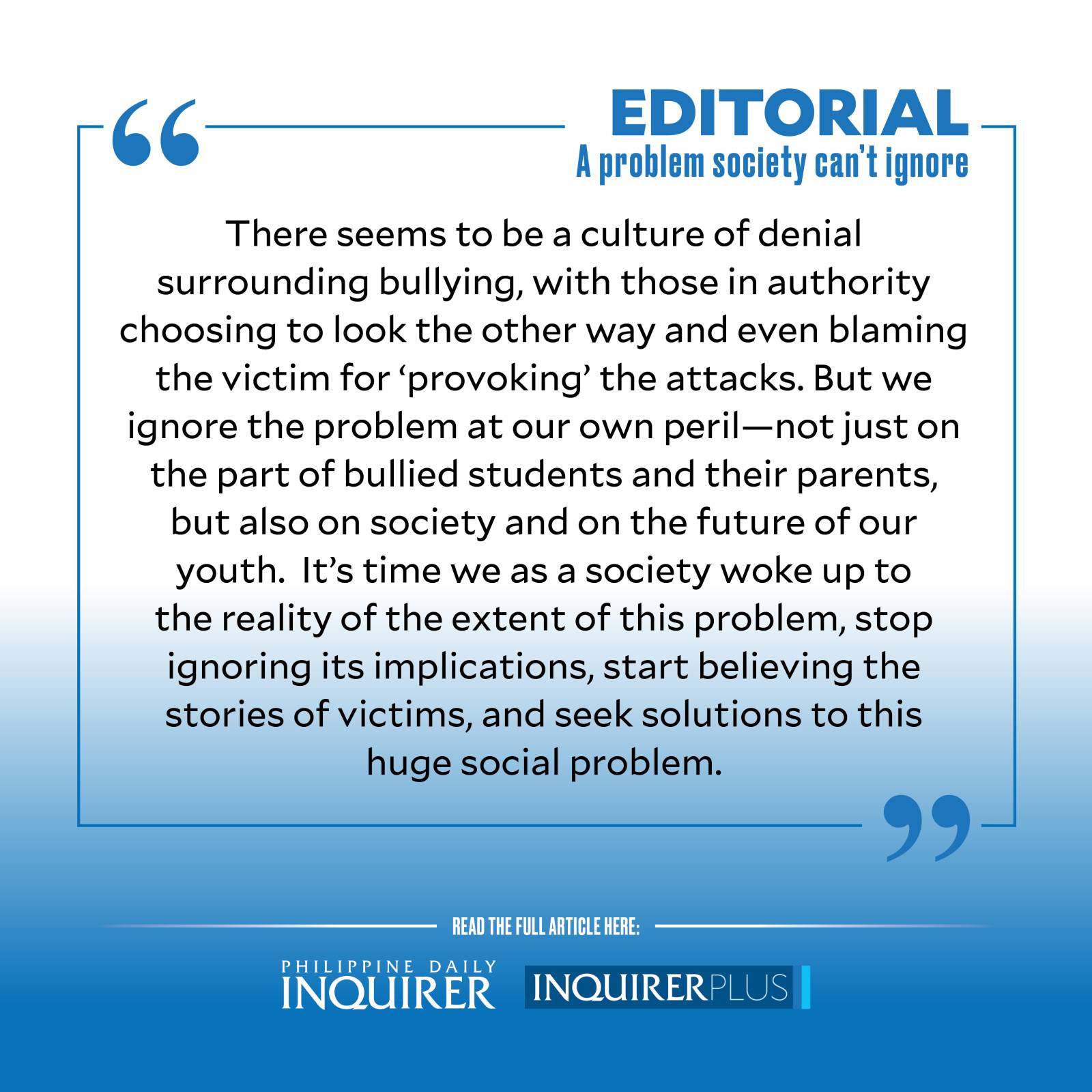A problem society can’t ignore

Two contrasting statistics about Filipino learners have lately grabbed public attention and concern.
The most recent is the finding that, according to an international study, Filipino students are the most bullied among young people in 70 countries around the world. In a Senate hearing, Sen. Sherwin Gatchalian cited the findings of the Programme for International Student Assessment, since validated by local surveys, that 65 percent of Filipino students nationwide have experienced bullying. Gatchalian said this translates to 17.5 million students beset by this problem.
The other statistic is an old but still apparently unaddressed question of the poor performance of our students in international assessments. And apparently, these reports are inextricably linked. “Scores of students [in math] go down as they experience being bullied,” Gatchalian pointed out. “In math, those who were never bullied scored 351 points (while) those who were bullied [scored only] 269 points—a difference of 82 points.”
Clearly, bullying—either physical, psychological, emotional, or even sexual abuse—has an impact not just on the physical health and academic performance of young people, but especially so on their mental health and emotional stability.
But one senator apparently sees a disconnect between the physical abuse of young people at the hands of peers and maybe even teachers, and their mental and emotional state.
At the same hearing, Sen. Robinhood Padilla said he saw no problem with “slight physical bullying” in schools. Indeed, he said, undergoing physical harassment and torture may even have helped him while he was growing up. The real problem, he added, is the “mental bullying” inflicted on those who somehow attract the unwanted attention of bullies.
Which may perhaps explain why teachers, administrators, and adults in school, not to mention those students who stand by and do nothing and even cheer on the ongoing harassment, tend to take complaints of bullying with the proverbial grain of salt. There seems to be a culture of denial surrounding bullying, with those in authority choosing to look the other way and even blaming the victim for “provoking” the attacks.
But we ignore the problem at our own peril—not just on the part of bullied students and their parents, but also on society and on the future of our youth.
Dr. Ma. Lourdes Carandang, a noted psychologist and family relations expert, made a direct link between bullying and the issue of mental health, not just for the victims but even for the bullies themselves. Incidents of bullying, she said, have been proven to result in adolescent depression and “suicidal ideation” or the notion that suicide is the only way out of an untenable situation.
Indeed, the Department of Education (DepEd) earlier reported that 404 learners nationwide killed themselves while 2,147 others attempted suicide during the school year 2021-2022. The child advocacy group Save the Children Philippines (SCP) said that most of bullied students are female, at 70.5 percent, with the most common triggers being physical appearance, status in life, and skin color. Another study found that among the most vulnerable are children with disabilities and those belonging in the LGBTQ plus spectrum.
As for the perpetrators, Dr. Bernadette Madrid, a recent Magsaysay Awards laureate for her work with women and children victims of violence, said that most bullies experience physical violence from family members, with their behavior reflecting what he or she is experiencing at home. Clearly, they, too, need some form of counseling.
Given the extent of bullying in schools, resource persons at the hearing urged the Department of Health to prioritize integrating mental health care into primary care by increasing the accessibility of mental health services and training primary care professionals. This should start with DepEd allocating funds to hire more counselors who are currently struggling to cope with heavy workloads. Save the Children likewise urged other government agencies, such as the Department of Social Welfare and Development and especially DepEd, to offer more child-friendly mental health programs and address “the overall psychosocial needs of the entire family.”
As a society, we can no longer afford to ignore the impact of bullying—a reflection of the culture of violence not just in schools but in the home and the overall environment—on our children and families. It’s time we as a society woke up to the reality of the extent of this problem, stop ignoring its implications, start believing the stories of victims, and seek solutions to this huge social problem.




















